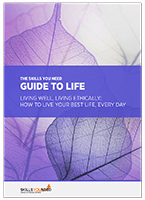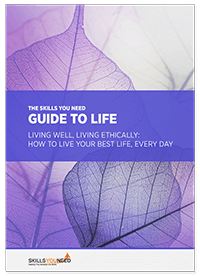Goodness: Learning to Use Your ‘Moral Compass’
See also: Developing Good Temper‘Goodness’ may sound like an old-fashioned term, conjuring up images of Jane Eyre, or other historical heroines. But it is also the foundation to living well and ethically.
Our page on Living Well, Living Ethically explains the basis of historical thinking about the virtues and foundations of a ‘good’ life.
This page sets out some more practical ideas about how you can develop your own ‘good’ sense, or ability to understand how to live well.
Goodness Acts as a Compass
If Aristotle’s virtues generally are a guide or map for how to live, ‘goodness’ is the compass that enables us to read the map the right way up, and work out which way to go.
There’s nothing new about this idea; people have been talking about a ‘moral compass’ for years. The key is to develop your sense of goodness so that it guides you in the right direction.
What is Right?
‘Right’ is not used here to describe a pre-determined course of action, but the one that is correct for you, in that it is consistent with both Aristotle’s virtues and description of a ‘good life’ and your own personal values.
Crucially, your ‘moral compass’ points towards a life that will allow you to flourish as a human being and, hopefully, to have few regrets about the way that you have lived.
Working Out Where You Stand
Perhaps the first step to becoming more conscious of your own moral compass, and moving towards living a ‘good’ life, is to think about what you don’t do well. What is your ‘Kryptonite’ when it comes to life?
Are you:
- Inclined to hesitate over decisions?
Do you, perhaps, spend too much time worrying about what is the right thing to do, and not acting on your decisions? - Inclined to act too quickly?
Without thinking through the consequences of your actions? - Inclined to be swayed and/or influenced by other people?
Rather than making your own decisions? It is important to take into account what others think but, if that conflicts with what you think is right, are you swayed by them? - Inclined to hold too firmly to your own views?
Even when everyone else you know, including people whose opinion you value, thinks that you are wrong?
Once you have identified your weaknesses, you can then start to think about how you might use your moral compass to overcome them.
Using Your Moral Compass
Our page on Recognising and Managing Emotions stresses the importance of making decisions by drawing on both emotions and reason. When you use your ‘moral compass’, you need to draw on both again.
There are three main steps to using your moral compass to inform your decisions and actions.
1. Gathering Information
The main question you should ask yourself before you act is:
‘What do I need to know to make a better decision about what to do?’
The answer to this question comes from:
Your history and memories of past situations that were similar, enabling you to learn from experience, both success and failure;
Your understanding of what needs to be done;
Your values, and what you would need to do to act ‘well’, or how you could use the situation to improve yourself in some way.
Together, these sources of information will help you to understand how you can apply what you already know to the situation. It is vital that you are honest with yourself about what you are and are not capable of, and the effects of your actions in the past, as you will otherwise repeat previous mistakes.
As Einstein said, ‘insanity is repeating the same behaviour and expecting different results.’
This process doesn’t have to take long. In fact, it may be done in just a few minutes. It’s the fact of going through the process effectively that is important, not the time it takes.
2. Evaluate and Consider the Information that you have Gathered
Now you need to make a judgement about the relative merits and value of all the information that you have gathered. You also need to consider what kind of action or response would fit with your values, and would have a ‘good’ effect for both you and those around you.
It is important to be open-minded in evaluation, and you may want to involve other people at this stage. It’s a good thing to seek help with difficult decisions, or when you don’t know what to do, but do be aware that if you have a tendency to hesitate or delay decision-making, you may be playing to your weakness.
3. Decide and Do
This sounds very action-focused, but you also need to include consideration of how you act: boldly, carefully, gently, firmly and so on. Consider the effects of your actions on yourself and others. Crucially, the action that you take should express the way that you hope or wish to be.
If you have a tendency to hesitate, then concentrate on deciding and then acting swiftly. Understand that you can’t know everything and there will always be an element of risk in any decision. Sometimes, the fact of the decision is more important than its content. Equally, if you have a tendency to rush blindly in, take a moment to pause and consider the likely effects of your actions, including the risks for you and others.
Further Reading from Skills You Need
The Skills You Need Guide to Life: Living Well, Living Ethically
Looking after your physical and mental health is important. It is, however, not enough. Maslow’s famous hierarchy of needs suggests that most of us need more than that. We need to know that we are living our ‘best life’: that we are doing all we can to lead a ‘good life’ that we will not regret later on.
Based on some of our most popular content, this eBook will help you to live that life. It explains about the concepts of living well and ‘goodness’, together with how to develop your own ‘moral compass’.
Living Well
At the end of the day, being ‘good’, or living well, is all about balance. Balance between reason and emotion, and between your needs and those of others, and between pragmatism and ‘the perfect solution’.
You will have a reasonable chance of achieving this balance if you can say that you know what you ‘ought’ to do in the situation, drawing on your experience, how to do it, and what effect it will have on both you and others, rationally and emotionally.
The only question left is whether you can see a way in which you can do it that is consistent with your values.


